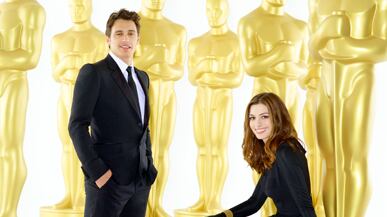A week ago, James Franco joined Twitter. He has since racked up over 150,000 followers. Besides being kept up to date on the 127 Hours star’s whereabouts—“I’m on my way to a meeting with one of my favorite artists, Richard Prince,” was one tweet—Franco’s acolytes have been treated to teasers for this Sunday’s Academy Awards ceremony, which Franco is co-hosting with Anne Hathaway.

On Thursday, Franco linked to YouTube footage of the co-hosts performing a Grease-inspired dance number, which will presumably be featured on the ABC telecast. And earlier in the week, he posted an “omitted oscar song”: an audio recording of him warbling tunelessly through the Cher belter “ You Haven’t Seen the Last of Me,” from the film Burlesque.
The Academy has long struggled with the dilemma of how to draw a younger, hipper audience to the ratings-challenged Oscars, with every year bringing new ploys: A John Hughes tribute! Bringing in the Twilight cast to present awards! Chris Rock as host! Cutting out musical numbers!
The decision by this year’s Oscar producers Bruce Cohen and Don Mischer to hire Franco and Hathaway—the youngest hosts in the history of Oscar—was itself a drastic act in the progressive slouch toward a cooler, more populist Academy Awards. But in the days leading up to the show, what’s even more dramatic is how the stars are being used as aggressive marketing tools to sell one of the most staid and traditional ceremonies in American culture as a cheeky, irreverent party to which—as this year’s Oscar slogan goes—“You’re invited.”
In addition to Franco’s Twitter debut (he also joined Facebook), a number of humorous videos have been “leaked” online. In one, Hathaway races through a monologue, reading a teleprompter set to speed-read. In other, she and Franco pair cross-train for the show. Wearing “Oscar Co-host In Training” T-shirts and sweats, they lift weights, using Oscar statuettes as barbells; sprint around towering Oscar mannequins; and time each other’s bathroom breaks. In another video, Franco Skypes with writer-director Judd Apatow (who is emceeing the Producers Guild Awards), and asks him for hosting advice. (“How do you do it?” Franco asks with all the enthusiasm of a stoner. “Like, is there a class I can take?”)
Considering that historically, ads for the Oscar broadcast have amounted to an old guy in a tux, talking ceremoniously in the shadow of towering golden statues, this year’s approach “amounts to a media revolution for the Oscars,” said Tom O’Neil, of the awards website GoldDerby.com. “Last year [Oscar co-producer] Adam Shankman may have been tweeting, but it was nothing like this.
“It’s also very cost-efficient,” O’Neil pointed out. “Why buy more promo ads on ABC affiliates or billboards around L.A., when you can just set James Franco loose with his Skype and his Twitter?”
“There’s not a great deal of curiosity” about the Oscars, said one Academy member. “It’s not like, who’s going to win the Super Bowl.”
The heavy viral marketing is also taking some of the pressure off the actual show. However the youthful hosts handle themselves on Sunday—and they could well bomb, given their inexperience in live entertainment—almost feels moot at this point, in the same way that a tentpole movie’s fortune rests not on how good or bad it is, but on how it’s sold to the public before its all-important opening weekend. It’s an evergreen Hollywood strategy, but one that’s especially relevant in a year when so much about the Oscars feels predetermined and snooze-festy. Unlike last year, when there was a palpable, heated race between Avatar and The Hurt Locker for Best Picture, The King’s Speech is expected to blanket Sunday’s awards. Even the categories that the film won’t likely dominate are considered done deals: The Fighter’s Christian Bale for Best Supporting Actor; Black Swan’s Natalie Portman for Best Actress; The Social Network for Best Adapted Screenplay, etc. (Ironically, whatever is going on with the promotions, the actual Oscar race has never felt more stodgy and traditional, given the anticipated Social Network snub.)
As one Academy member put it: “There’s not a great deal of curiosity. Colin Firth is a lock for Best Actor. I don’t see a lot of debate online over Annette Bening versus Natalie Portman. I just don’t see a lot of, ‘Oh my God!’ It’s not like who’s going to win the Super Bowl.”
Hence the focus on the pre-game hijinks. Even those, like O’Neil, who find the teasers “silly” and somewhat “hollow,” admit the Academy deserves props for going so against-type, not just in the promos themselves, but in hiring someone like Franco, who drew some derision when he was first announced as a co-host. His chronic multi-tasking, after all, has made him an easy target for mockery over the past year, and has almost overshadowed his acting career (most have probably forgotten that he’s not only hosting the Oscars, he’s up for an Oscar).
But it’s Franco’s offbeat reputation, and his delight in playful self-expression—whether via General Hospital or Three’s Company art installations—that plays perfectly into the Academy’s attempt to rebrand the Oscars as, well, playful. To use a branding buzz word, Franco makes the whole exercise feel authentic. It’s hard to imagine much arm-twisting is necessary to get him to make these adverts, not to mention that there’s an appealingly subversive—and, again, very believable—hint that at times the actor is going rogue with his creations. Hours after the “omitted oscar song” went online, it was mysteriously pulled, suggesting that it may not have been OK’d by the powers that be. Later, it was reposted.
Beyond its hosts, the Oscars telecast itself is being positioned as more au courant than ever before. Scenes from backstage will be live-streamed on the Academy’s new, updated website. Mothers of certain nominees have been conscripted to live tweet the broadcast. And, of course, there is an Oscar app.
According to Bill Mechanic, who co-produced last year’s Oscars with Adam Shankman, some of these innovations were discussed last year, but were prohibited because of technology.
“We got shot down 100 percent because there was no technical capability. It wasn’t that they resisted us, in fact they were more than prepared to break some rules, but there were just no technical capabilities. The [Academy’s] website was from the Stone Ages.
“They’ve done a lot of work in a year.”
The real question, of course, is will all of the tweeting and YouTubing actually make a difference this time round?
“The Academy is now off on an effort,” said publicist and branding expert Michael Levine. “When you start something, when you get on the journey, not everything that you try on the journey works. Sometimes, people over-correct, they over-do. So the story isn’t really written yet as to whether this battle plan is an over-correction. But I think it’s a viable and appropriate effort, because the alternative was sure death.”
Nicole LaPorte is the senior West Coast reporter for The Daily Beast and the author of The Men Who Would Be King: An Almost Epic Tale of Moguls, Movies, and a Company Called DreamWorks.





